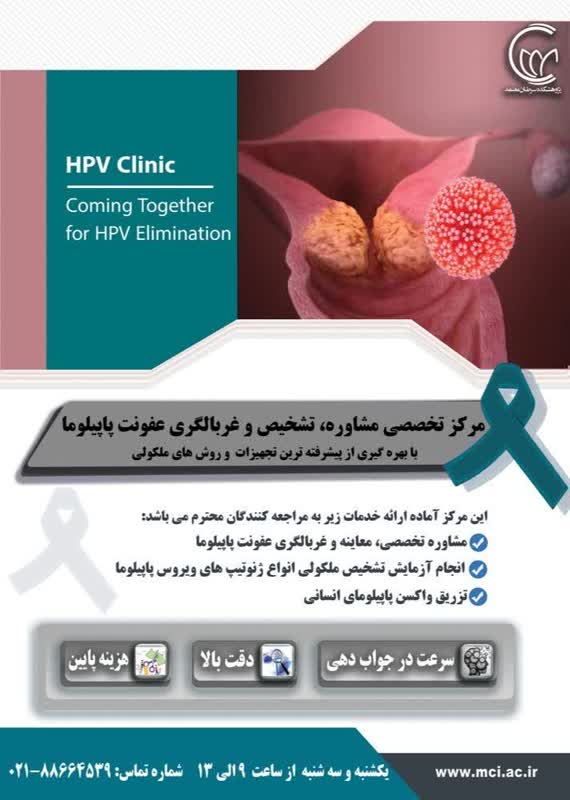Specialized center for consultation, diagnosis and screening of papilloma infection (HPV)

HPV molecular screening and diagnosis center
You must have heard the name of papilloma virus (HPV), the cause of genital warts; A virus that is considered to be one of the most common sexually transmitted infections and the main cause of cervical cancer in women, and has made a significant impact on the social life of people in today's world. Cervical cancer is the second most common cancer in women after breast cancer, with an annual incidence rate of about 493,000, leading to the death of about 273,500 people.
This virus is also responsible for genital and anal cancers in men. Certain types of papilloma virus also cause head and neck cancers (mouth, tongue, tonsils and larynx) in men and women. The incidence of this cancer in men is much lower than in women.
This virus contains 200 different genotypes, about 40 of which cause infection in human genital tissues and are divided into 2 categories due to the risk of causing cancer: 14 high-risk types (types 16, 18, 31, 33, 35 , 39, 45, 51, 52, 56, 58, 59, 66 and 68) and the rest of the low risk types (6, 11, 40, 42, 43, 44, 53, 54, 61, 72, 73, 81 and A number of others) are divided. The most common types with high risk in women are usually types 16, 18 and 45. The most common low-risk types are genotypes 6 and 11, which cause genital warts in about 90% of cases, so genital warts are benign and self-limiting in 90% of cases.
Today, there are accurate, reliable and sensitive tests to identify HPV viruses. In many cases, the wart is easily visible and recognizable from its appearance, but in order to determine whether the papilloma virus is a high-risk or low-risk type for causing cancer, the presence of the virus in the wart must be determined by tests. To be confirmed and typed by a laboratory.
Your doctor may be able to diagnose HPV infection by looking at your warts. If the genital wart is not visible, you will need one or more of the following tests:
- Molecular testing for HPV detection; This test, performed on cervical cells, can detect the DNA of high-risk types of HPV that are associated with genital cancers. This test, in addition to the Pap test, is recommended for women 30 years and older.
- Pap smear test: Your doctor collects a sample of cells from your cervix or vagina to send for laboratory analysis. A Pap test can show abnormalities that could lead to cancer.
With regard to the increase in the frequency of malignancies such as cervical cancer in women and the importance of providing care system services in the control and prevention of the human papilloma virus, including the knowledge about this virus and related diseases, ACECR Motamed Cancer Research Institute, based on the infrastructure of the molecular diagnosis laboratory of COVID-19, launched a papilloma virus diagnosis and screening center. One of the goals of the Papilloma Virus Diagnosis and Screening Center is to recognize, educate, prevent, treat and advise on this health-social problem. Another task of the Papilloma Virus Diagnosis and Screening Center is to provide public access to the vaccines approved by the Ministry of Health, Treatment and Medical Education related to the Papilloma Virus.
Other prominent features of this center include the following points:
- Fast result of all laboratory tests compared to other virology laboratories
- Molecular diagnosis with the help of the most advanced tools and using kits approved by the Ministry of Health and Medical Education
- Referring patients to the center's gynecologist if needed as soon as possible, without causing confusion for the patient
- Centralization of all diagnostic and treatment facilities to make patient access as easy as possible
- The small cost of diagnosis and consultation is even lower than the announced tariffs
Actions related to HPV molecular diagnosis and screening center
You'll probably start your primary care by visiting a Papilloma Infection Diagnosis, Treatment, and Screening Center.
Before your appointment, make a list of the following:
- Your symptoms, even those that seem unrelated.
- Key personal information, including major stressors, recent life changes and your sexual history
- Any medications, vitamins, or other supplements you take.
Questions to ask your doctor:
- What is the most likely cause of my symptoms?
- Are there other possible reasons?
- Do I need to do any tests?
- How can I prevent HPV infection in the future?
- Are there any brochures or other printed materials I can have? What websites do you recommend?
Your doctor will probably ask you questions, such as:
- When did your symptoms start?
- Are you in a monogamous relationship? your life partner
- Where did you find waste?
- Are the lesions painful or itchy?
- Does anything seem to improve your symptoms?
- What seems to make your symptoms worse?



